Hey, fellow betta lovers!
So, you’ve clicked on this guide, meaning you’re curious, concerned, or both about your little finned friend. I totally get it. These vibrant, feisty little fish can quickly swim their way into our hearts, and it’s only natural that we’d want to know everything about them, including the more complex topics.
When I got my first Betta, Finley, I constantly looked for every bubble, swish, and wiggle. And when things seemed “off,” I’d find myself spiraling down the internet rabbit hole, trying to figure out what was happening.
This guide dives deep into the behavior of betta fish before death. Now, I know that’s not the cheeriest of topics, but knowing these signs can be invaluable. It can help you prepare emotionally and give you insights into when to seek help, change something in the tank, or give your Betta some extra TLC.
Buckle up, and let’s journey into betta behaviors and what they can tell us about our aquatic buddies. And remember, while this guide is packed with information, always trust your instincts regarding your pet. You know them best!
Normal Betta Fish Behavior vs. Abnormal Behavior
Typical Betta Behaviors
So, first things first, what’s considered “normal” for a betta? If you’ve had a betta for a while or have just been observing one at a store or a friend’s house, you’ve likely noticed some quirky, typical behaviors. Here are a few:
- Flaring: Oh, the classic betta flare! Betta fish are known for their aggressive personalities. When they see their reflection or another betta, they’ll often puff out their gills and fan out their fins. It’s their way of saying, “This is my turf!”
- Bubble Nesting: Male bettas blow bubbles at the water’s surface, creating a floating nest. It shows contentment and mating behavior, showing they’re ready for some betta babies.
- Exploration: Betta fish are naturally curious creatures. You’ll often see them exploring every nook and cranny of their tank, swimming up, down, and all around.
- Resting: Don’t be alarmed if you find your Betta chilling on a leaf or leaning against a decoration. They like rest just as much as we do!
Factors Influencing Normal Behavior
Now, it’s essential to remember that each Betta is an individual. What’s normal for one might be different for another. Factors like age, health, environment, and past experiences play a role in shaping their behavior.
When Things Get Fishy: Recognizing Abnormal Behaviors
Knowing what’s typical is half the battle; the other half is recognizing when things are a bit… off. Here are some behaviors that might raise eyebrows:
- Constant Hiding: While bettas like the occasional hideout, they shouldn’t spend all their time away from the world. If your fish is always hiding, it might be stressed or unwell.
- Not Eating: If your usually voracious eater suddenly turns its nose (or should I say gills?) up at food, it’s a cause for concern.
- Erratic Swimming: We’re not talking about the usual betta curiosity but somewhat chaotic, uncontrolled movements—like darting around or spinning in circles.
- Sinking or Floating: While bettas will swim to different levels of the tank, they should be able to stay at one or be stuck floating at the top or sinking to the bottom.
Remember, it’s all about balance. Occasionally, a betta might display one of these behaviors, which could be entirely harmless. But the persistence or sudden onset of these behaviors should have us paying attention.
So, now that you know about normal vs. abnormal behaviors, it’ll be easier to gauge your Betta’s mood and health. And hey, while we’re on health, let’s move on to some early warning signs to look out for. Ready to dive deeper?
Betta Fish Behavior Before Death
Let’s talk about those subtle cues our bettas give us when things aren’t quite right. Remember, these little ones can’t verbally tell us when they feel under the weather. Still, their behavior and physical changes often shout it out. So, what should we be on the lookout for?
1. Lethargy
- Less Swimming and More Resting: We all have lazy days, right? But if your Betta spends more time lounging than exploring, it might be a sign they need to feel better.
- Staying at the Bottom: An occasional rest at the bottom is okay, but it’s a red flag if your Betta has taken up seemingly permanent residence.
2. Change in Appetite
- Decreased Food Interest: You know the excitement your Betta shows during feeding time? If they’re suddenly indifferent or downright ignoring their food, something’s up.
- Not Eating at All: Betta fish usually skip meals for a reason. If they’re fasting, it’s time to pay attention.
3. Color Changes
- Fading Colors or Pale Appearance: A healthy betta is vibrant and full of color. If you start noticing them turning a shade lighter or their colors seem less pronounced, it’s cause for concern.
- Dark Horizontal Stress Stripes: These are pretty much what they sound like – lines that indicate your Betta’s stress. They’re not a fashion statement; they’re a cry for help!
4. Uncharacteristic Aggression or Passivity
- Too Much Flaring: While flaring is a normal betta behavior, excessive or prolonged flaring at everything and nothing can indicate stress or territorial issues.
- Being Bullied or Bullying: If you have a community tank and notice your Betta being picked on or picking on others more than usual, this dynamic shift can be an early warning sign of stress or illness.
5. Difficulty Breathing
- Frequent surface Gasping: If your Betta is frequently racing to the surface, gasping for air, and then quickly diving back down, they might have trouble breathing, possibly due to water quality issues or respiratory infections.
The thing about these early warning signs is that they can often be subtle. As betta parents, our keen observations and understanding of our fish’s behavior become our best tools. By catching these early signs, we can often make adjustments in care or environment that can change the course of our Betta’s health. It’s all about being proactive and keeping those fins flapping happily!

Physical Symptoms and Illnesses
Diving a bit deeper now. Beyond the behavioral shifts, our bettas can also show us physical signs when they’re not feeling their best. These outward symptoms often align with internal issues or environmental stressors. Let’s uncover some of these, shall we?
1. Clamped Fins
- Recognizing the Signs: Instead of displaying their gorgeous, flowy fins, bettas with clamped fins will keep them tight to their bodies. It’s as if they’re giving themselves a hug, but not the warm and fuzzy kind.
- Underlying Causes: Stress, poor water conditions, and various diseases can lead to clamped fins.
2. Dropsy
- Bloating and Scales Sticking Out: Think of your Betta as a little pinecone. This swelling and protruding scales is a telltale sign of dropsy.
- Causes and Treatments: Dropsy isn’t a disease but a symptom of an internal issue, often kidney failure. Early detection and treatment are crucial, but honestly, it’s a tough one to treat.
3. Fin Rot and Other Fin Diseases
- Discoloration and Tattering of Fins: If the edges of your Betta’s fins start looking ragged, discolored, or like they’ve been nibbled on, that’s fin rot setting in.
- Preventative Measures: Keeping the tank clean and ensuring good water quality are critical. If you notice fin rot, timely treatment with the proper medications can help.
4. Swim Bladder Disease
- Struggling to Swim or Staying Tilted: If your Betta seems to be doing an unintentional backflip, floating on one side, or having trouble staying buoyant, swim bladder issues might be at play.
- Causes and Treatment Options: Overfeeding, constipation, or bacterial infections can mess with the swim bladder. Adjusting the diet and ensuring a clean environment can assist in recovery.
5. External Parasites and White Spots (Ich)
- Tiny White Dots on Body: Imagine your Betta looking like it’s been sprinkled with salt. Those little white spots are parasites and are as nasty as they sound.
- Treatment: Ich is treatable, but you’ve got to act fast! Raise the tank temperature a bit and get some anti-parasitic treatments going.
6. Cloudy Eyes
- Eyes Losing Their Clarity: If your Betta’s eyes start looking foggy or lose their usual sparkle, it’s cause for concern.
- Potential Causes: This could be due to bacterial infections, injuries, or poor water conditions.
7. Bulging Eyes
- Protruding Eye Appearance: Also known as “pop-eye,” this condition is exactly what it sounds like. One or both eyes of your Betta start bulging outward.
- Underlying Reasons can be bacterial infections, injuries, or internal issues.
Keeping an eye (pun intended!) on our bettas and watching out for these physical symptoms can give us a jumpstart on treatments. Many of these conditions sound scary, but our finned pals can bounce back with the proper care, attention, and sometimes medication. Always consult with an aquatic vet or specialist if you need clarification. It’s better to be safe than sorry!
Behavioral Indications
So we’ve discussed the physical signs, but sometimes, the clues lie not in how our bettas look but in how they act. Observing these behavioral nuances as their caretakers can give us the first hint that something might be amiss.
1. Scratching Against Objects
- The Behavior: Have you ever seen your Betta rubbing itself against gravel, plants, or decorations, almost like it’s trying to scratch an itch? This behavior is known as “flashing.”
- Possible Causes: Parasites or irritations on their skin could be bugging them.
2. Labored Breathing
- The Behavior: Your Betta seems to be taking deep, strained breaths, often accompanied by more frequent trips to the surface to gulp air.
- Potential Issues: This can be due to poor water quality, low oxygen levels, or respiratory infections.
3. Loss of Interest in Surroundings
- The Behavior: Remember that naturally curious side of bettas we talked about? If they’re suddenly indifferent to their environment, new toys, or changes in their tank, it’s a sign.
- Underlying Causes: Stress, illness, or aging can cause a betta to become less interactive.
4. Sudden Aggressiveness or Territoriality
- The Behavior: Maybe your Betta has always been a bit of a peacekeeper, but suddenly, it’s chasing other tank mates or becoming more dominant.
- Possible Triggers: This could respond to environmental changes, perceived threats, or internal discomfort.
5. Decreased Responsiveness
- The Behavior: You know how your Betta would usually come swimming to the front of the tank when you approach, almost like they’re saying hello? If they’re no longer reacting or seem disinterested, take note.
- What It Could Mean: They could be under the weather or experiencing stress or anxiety.
6. Change in Sleeping Patterns
- The Behavior: All living creatures have a somewhat predictable sleep cycle, bettas included. If your fishy friend is sleeping more than usual or at odd times, it’s noteworthy.
- Potential Causes: This can be tied to health issues, stress, or changes in tank lighting.
7. Sudden Preference for Tank Corners
- The Behavior: If your Betta suddenly seems to have a favorite corner and barely moves away from it, that’s unusual.
- Probable Reasons: It could be due to water current issues, bullying from other fish, or a sign of not feeling well.
Tuning into these behavioral signals is like learning a new language—the language of Betta! And trust me, once you’re fluent, you’ll appreciate the depth of communication these little beings are capable of. Keep those observational skills sharp, and remember, it’s always good to consult with fellow betta enthusiasts or experts when in doubt. Our friends rely on us to understand them; every little sign is a step closer to ensuring their well-being. Swim on, and keep listening!
Environmental Factors Influencing Health
Alright, deep breath (not from the surface like our bettas, though)! The environment in which our bettas live plays a monumental role in their overall health and well-being. Think of it as the ambiance at your favorite cafe. If things aren’t correct, the coffee doesn’t taste the same. Let’s dive into some environmental aspects that can affect Betta’s health.
1. Water Quality
- Importance: It’s comparable to the very air we take in. Inferior water conditions can cause a multitude of health problems for our bettas.
- Key Factors: Regular checks for ammonia, nitrites, nitrates, and pH levels are crucial. Use water conditioners and frequent water changes to maintain balance.
2. Temperature Fluctuations
- Stability Matters: Betta fish are tropical creatures, so they prefer a stable temperature, usually between 76°F to 80°F (24°C to 27°C).
- Potential Threats: Too many fluctuations or extremes can stress the Betta and weaken their immune system.
3. Tank Size and Space
- Room to Roam: While bettas can survive in smaller spaces, they thrive in 5-gallon or larger tanks.
- Impact: A cramped space can stress them out, decreasing activity and potential health issues.
4. Lighting
- Natural Rhythms: Bettas, like many creatures, have a circadian rhythm. Proper lighting helps them regulate their sleep-wake cycle.
- Guidelines: 8-12 hours of light followed by darkness is usually ideal. Overexposure or constant darkness can stress them out.
5. Decor and Enrichment
- Safe Exploration: Bettas love to explore, but sharp or rough decorations can tear their delicate fins.
- Tips: Opt for silk plants over plastic ones, and ensure caves or hideouts don’t have sharp edges.
6. Current and Filtration
- Go with the Flow: Bettas aren’t fans of strong currents. Their long fins aren’t designed for rapid waters.
- Finding Balance: A gentle filter that keeps the water clean without creating a whirlpool is vital.
7. Tankmates
- Choose Wisely: Not all fish are friendly neighbors for bettas. Some can be fin-nippers or overly aggressive.
- Recommendations: Research compatible tankmates like snails, shrimp, or peaceful community fish.
8. Maintenance Routine
- Stay Regular: Consistent cleaning, water changes, and equipment checks help maintain a healthy environment.
- The Impact: Neglecting regular maintenance can lead to the build-up of harmful toxins and potential health issues for the Betta.
It’s like setting up the perfect room for a loved one. Every detail matters, from the water’s cleanliness to the decor’s texture. By ensuring an optimal environment for our bettas, we’re not just giving them a place to live; we’re creating a space where they can thrive. Remember, a happy betta is an active, curious, and colorful betta! Let’s keep their world as vibrant as they are.

Prevention and Care
The best cure, as they say, is prevention. Instead of waiting for issues to crop up and then dealing with them, it’s smarter (and kinder) to be proactive. So, how do we keep our betta fish happy and hearty from the get-go?
1. Regular Monitoring
- Checkups: Just like we need our regular doctor’s visits, regularly observing and checking our bettas for any signs of stress, illness, or injury is essential.
- Water Testing: Invest in a good water test kit. Regularly checking the water parameters can help you nip potential problems in the bud.
2. Balanced Diet
- Variety is Key: While betta pellets are great, occasionally offering them treats like freeze-dried bloodworms, brine shrimp, or daphnia can boost their health and morale.
- Moderation Matters: Overfeeding can lead to constipation or other health issues, so ensure you give them the right amount.
3. Proper Tank Set-Up
- Research: Before setting up, do your homework. Ensure you have the suitable substrate, filter, heater, and light conditions.
- Maintenance: Stick to a routine cleaning schedule. Regular water changes and equipment checks are a must.
4. Quarantine New Additions
- Isolation: When introducing new tank mates or plants, it’s wise to quarantine them first to ensure they don’t bring in diseases.
- Duration: Typically, a few weeks should suffice, but if you notice any signs of disease, it’s best to treat and ensure the newcomers are healthy before the introduction.
5. Stress Reduction
- Comfortable Environment: From choosing the right decor to ensuring the correct water temperature, make your Betta’s tank a stress-free zone.
- Limit Disturbances: Avoid frequently moving the tank, loud noises, or excessive light, which can stress your Betta.
Conclusion
And there we have it—a comprehensive guide to better understanding our betta buddies. Bettas have this royal, majestic vibe with their flowing fins and striking colors. They might not wear crowns, but they are the kings and queens of our aquatic realms. Treating them with the care, respect, and attention they deserve is the least we can do.
By being observant, proactive, and ever-curious, we can ensure our bettas lead long, healthy, and happy lives. Every bubble they blow, every graceful dance through the water plants, and every excited wiggle during feeding time is their way of saying, “Thanks for caring!”
So, here’s to the vibrant world of bettas, the joy they bring into our lives, and the beautiful journey of companionship we embark on with them. Cheers to every Betta parent out there, and may your fishy friend always swim with happiness!
